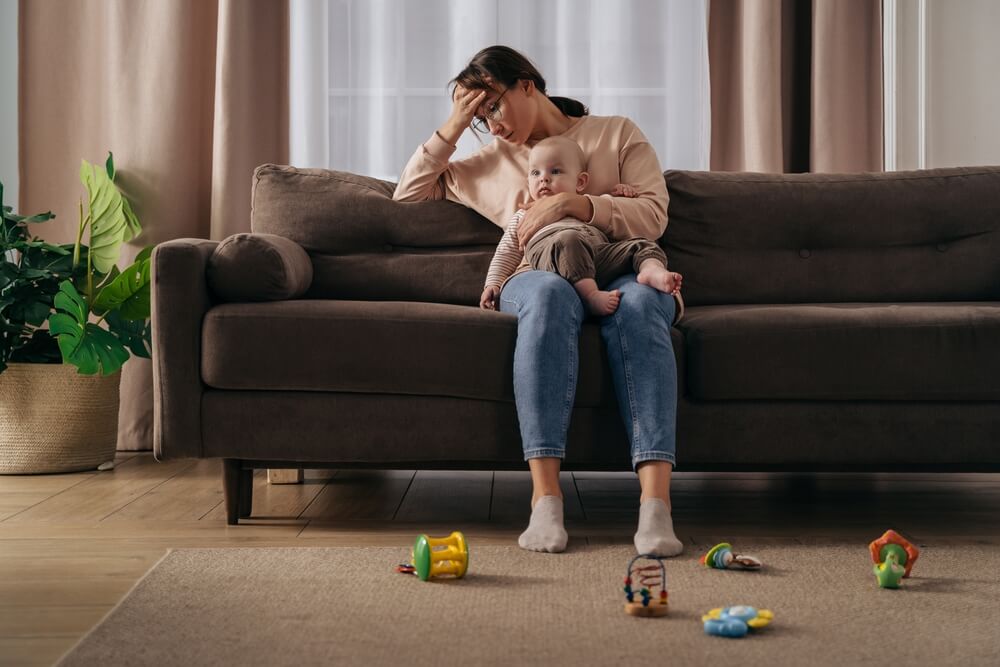What Is Postpartum Depression?
Giving birth is an unforgettable and joyous experience, but it can be overwhelming as well. It is common for new mothers to go through a range of different emotions. Postpartum depression, also known as PPD, is a kind of depression that affects some women after giving birth. It impacts up to 15% of mothers, and the first signs of the condition usually show up about four weeks after delivery. Not only can birthing women be affected, but adoptive parents and surrogates as well.
Depression after birth is generally treated with counseling methods and medication. If you are experiencing extreme feelings of sadness or loneliness, have an intense urge to cry, or have severe mood swings, we urge you to get in touch with our caring obstetrician in Sarasota, Florida, who is qualified to help you manage these symptoms. Our friendly staff at University Park OBGYN is here for you.
Types of Postpartum Depression

There are three different types of PPD:
- Postpartum blues or “baby blues” – This is the most common type of depression after birth. It affects around 50% to 75% of women. In the first few days after having a baby, you may have intense feelings of sadness without a particular reason and feel more tired than usual. The most common symptoms include anxiety, sadness, and sudden mood changes. Although it might feel overwhelming, this condition usually decreases after two weeks without any additional treatment. If your symptoms last longer than that, make sure to contact your doctor to get tested for postpartum depression.
- Postpartum depression – A more severe form of anxiety than the baby blues, which affects about one in seven mothers. If you have had PPD before, the risk of getting it again in your subsequent pregnancy increases. People usually describe having mood changes from extreme highs to extreme lows, fatigue, irritability, sensations of guilt, and incapability to take care of themselves or their baby. Symptoms can range from mild to severe and sometimes can even show after a year. Fortunately, it can be treated with the help of a therapist and antidepressants.
- Postpartum psychosis – This is a serious condition and an intense form of PPD. It demands immediate medical attention and should never be left untreated, as there is always a risk of suicide. Postpartum psychosis is a rather rare disorder, affecting about one in 1000 women. First signs show up quickly after delivery and include paranoia, confusion, hallucinations, mania, hyperactivity, feelings of hopelessness or shame, and others. Treatment requires hospitalization, medication, and therapy.
How Do I Know If I Have PPD?
Many women have mood swings or intense feelings after giving birth, which doesn’t necessarily mean they suffer from depression after childbirth. New parents go through significant life changes, so it is normal for intense feelings to occur a few weeks or months after the delivery. Many people mistake baby blues for postpartum depression. These are the most common signs of postpartum depression:
- Feelings of guilt or sadness
- Anxiety or panic attacks
- Frequent urges to cry
- Worrying a lot
- Withdrawing from your loved ones
- Hopelessness
- Having no energy, even for everyday tasks
- Having a hard time focusing on things
- Weight loss, weight gain, changes in appetite
- Thoughts about harming yourself or your baby
If you are experiencing suicidal thoughts or thinking about harming yourself or your child, seek immediate help. Ask your partner or family members to take care of your baby while you get better. Don’t forget; help is always available.
What Causes PPD?
If you suffer from postpartum depression, it is not your fault. Experts think this condition is caused by many factors, and every person has a different trigger. However, they do agree on some general things that raise the risk of getting it, such as:
- A history of depression or depressive episodes before the pregnancy
- The age you are pregnant (the younger you are, the higher the chance of suffering from PPD)
- Number of children (if you have more than one child, you have higher chances of getting it in your subsequent pregnancy)
- Having a child with special needs
- Living alone
- Marital conflicts
- Having twins or triplets
- Family history of mood disruptions
- Going through a stressful event, such as a death of a loved one or a health crisis
- Ambivalence about the pregnancy
- Inflexible social support
There are also physical factors as well, like:
- Hormones – After giving birth, the amount of estrogen and progesterone naturally decreases, which can lead to mood swings. Thyroid gland hormones diminish as well, which can make you tired and depressed. By not sleeping enough, all of those feelings will intensify.
- Anxiety – It is normal to have intense emotions of fear when it comes to taking care of your newborn. Babies are fragile and needy, which can make you feel overwhelmed and scared.
How Can I Manage Postpartum Depression?

Although it may seem unsolvable at times, depression after birth can be successfully treatable with the correct approach and with the help of the right experts. The first step is to talk about your feelings and thoughts with your healthcare provider, who will help you understand them better. Postpartum depression is treated differently, depending on the type of disorder you have. Treatment choices include antidepressants or anti-anxiety medicines, psychotherapy, and lifestyle modifications. You can also try implementing these techniques to feel better:
- Improve your sleep regime; try sleeping as much as possible.
- Spend time with your partner, friends, and family. Try explaining to them how you feel and ask for any help you need.
- Try to take care of yourself and do things that you enjoyed before birth. Ask your partner or someone you trust to take care of the baby while you are out shopping or having fun.
- Don’t drink alcohol or smoke. These things increase the signs of postpartum depression.
- Have a healthy diet and stay physically active. Both of these tips help reduce stress.
- Try connecting with other women who gave birth recently
The Bottom Line
Postpartum depression is a mental disorder that affects many women around the world. Sometimes, people have a hard time admitting that they are depressed or anxious. The most important thing is to acknowledge these signs. Having these feelings does not make you a bad or incompetent mother. All of those chemical reactions that happen in your brain after giving birth are the main cause of PPD and are beyond your control. Call your healthcare provider if you are experiencing any signs of postpartum depression to determine your next step on this healing journey. We are always here for you at University Park OBGYN to listen to you and to help you find the best route for recovery. Remember, you are not alone!


